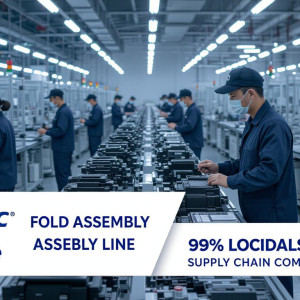Nidec’s Electric Engine: How China’s Supply Chain Mastery is Fueling Asia’s EV Revolution

The electric vehicle (EV) market in Asia is on fire, and Nidec Corporation is the engine--literally--driving this transformation. With a £407.6 billion regional EV market expected by 2025, Nidec's China-centric strategy isn't just an advantage; it's a blueprint for dominance. Let's break down how this Japanese giant is turning 99% local supply chains into a gold mine--and why investors should take note.

The Cost Edge: 99% Local, 100% Competitive
Nidec's secret? Going all-in on China's manufacturing ecosystem. By sourcing 99% of its EV motor components domestically, the company avoids cross-border tariffs and logistics headaches, slashing costs to levels foreign rivals can't match.
This isn't just about saving money--it's about enabling partners like Toyota[1] to price aggressively. The Toyota bZ3X, built with Nidec's E-Axle motor, now sells for JPY100,000-JPY200,000--a price point that's pure mass-market gold in China. The Gen.2 E-Axle, now in full production in Guangzhou, is lighter, quieter, and packed with innovations like magnet-free designs.
By ditching rare-earth magnets, Nidec cuts costs further and sidesteps geopolitical supply risks. Meanwhile, its Zhejiang plant--a certified "advanced smart factory"--uses AI-driven big data to optimize production. A new JPY100 million facility in Qingdao is set to churn out 18 million motors annually, all while reducing waste and energy use.
The math is clear: Nidec aims for 25%+ gross margins by 2025, fueled by this localized efficiency. Compare that to competitors stuck in high-cost global supply chains, and you see why Nidec is a cost leader.
Why Asia's EV Boom is Nidec's Oyster
The numbers don't lie. China alone will account for £377 billion of Asia's EV market by 2025, but Japan, India, and Southeast Asia are sprinting to catch up.
Nidec isn't just banking on China's dominance--it's leveraging partnerships to own the region. Take Toyota's Lexus EV plant in China: Nidec's localized motors are the backbone of this expansion. Beyond Toyota, deals with firms like Eve Air Mobility and Tata Elxsi are stitching Nidec into Asia's broader EV ecosystem.
Even its JPY257 billion acquisition of Makino Milling Machine--a move to diversify into industrial tools--creates synergies, giving Nidec control over critical manufacturing tech. With India's EV market growing at a 57% CAGR through 2034 and Japan's infrastructure push accelerating adoption, Nidec's China model is replicable. The company's 2030 goal of 45% global E-Axle market share isn't a pipe dream--it's a roadmap.
Risks?
Sure. But the Upside is Worth It
Skeptics will cite geopolitical tensions, China's EV price wars, and overcapacity risks. Nidec's E-Axle division even posted a JPY15 billion loss in 2024 due to shifting demand.
But here's the kicker: Nidec's agility is unmatched. It's already pivoting to focus on high-margin segments, like its in-wheel motor prototypes, while its in-house chip tech shields it from supply chain shocks. Analysts project 77.7% revenue CAGR through 2027, with EBIT margins turning positive by 2026.
Even at a 15x forward P/E, Nidec's stock looks cheap for a company positioned to capture Asia's £407 billion EV boom.
The Bottom Line: Buy the EV Supply Chain King
Nidec isn't just an EV parts supplier--it's a cost-cutting, tech-forward, China-savvy juggernaut. With Toyota's orders rising and Asian markets exploding, this is a stock that's primed to outperform. For investors, Nidec offers a rare combination: structural advantages (local supply chains, smart factories), strategic partnerships (Toyota, Foxconn), and a clear path to profitability.
If you believe in Asia's energy transition--and who doesn't?--Nidec is your front-row seat.
Action Item: Buy Nidec now while it's still under the radar.
The EV revolution isn't just coming--it's already here, and Nidec's engines are leading the charge.